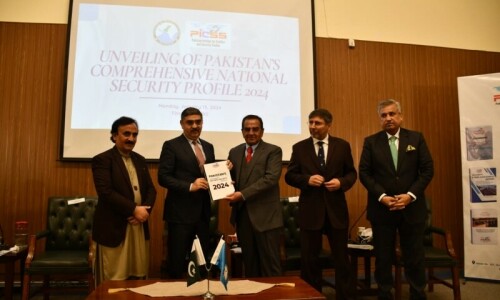MORE than three months have passed since the Taliban captured Kabul. They now control the whole of Afghanistan. However, they are still grappling with legal issues that can greatly impact their legitimacy both at home and internationally. The legal problems faced by the Taliban and possible solutions are discussed here.
Most of the laws of the previous government are still in vogue. The rub comes where human rights and in particular women rights are concerned. At the school level, girls are allowed to continue with their education only up to Class 7. Female education up to Class 12 has been allowed in a few provinces such as Balkh. Salgai Baran, the female student who topped the countrywide university entrance examination, has proceeded to Turkey on a scholarship for higher studies. But women still face many restrictions.
Most women workers, outside the education and health sectors, and those working at the passport directorate, have been asked to stay at home till a policy for women’s participation in the workforce is chalked out. Women were mostly excluded from education and jobs during the Taliban’s previous regime as well. This is the reason why many Afghans and international actors have reservations about the Taliban’s intentions.
First, the Taliban should come clean on these rights. They should declare their plans for the implementation of these rights, and the hurdles faced by them in their implementation. These human rights issues have an international dimension as well. Afghanistan is signatory to a host of human rights treaties such as the Convention against Torture and Other Cruel Inhuman or Degrading Treatment or Punishment, the International Covenant on Civil and Political Rights, and the Convention on the Elimination of All Forms of Discrimination against Women.
The Taliban should consider adopting the 2004 constitution.
Second, the Taliban may provisionally accept the human rights treaties till the formation of the government.
Third, the Taliban also need to clarify their stand on the US-Afghanistan Strategic Partnership Agreement(2012). It will terminate towards the end of 2024. A party could opt out at an earlier date by furnishing one year’s notice.
The Taliban have formed a transitional government. In a meeting with the Chinese ambassador, the acting justice minister Maulvi Abdul Hakim Sharai announced that the Afghan constitution of 1964 is worth adopting without such substance that negates Sharia principles, the policies and rules of the Islamic Emirate of Afghanistan and national interests. So far, it remains a news statement. The Afghan Ministry of Justice is still displaying the 2004 constitution as the current constitution.
From 1964 to 2004, the country had a number of constitutions — permanent, interim as well as drafts. These are the permanent Constitution of Afghanistan (1977) during president Mohammad Daud’s rule, Law for Regulating the Duties of the Revolutionary Council and the Government and Legislation Procedure (1978-1979) under president Noor Mohammad Taraki and Hafizullah Amin, the Interim Constitution of Afghanistan (1980) under president Babrak Karmal, the permanent constitutions of 1987 and 1990 under Dr Najibullah, and the draft constitution (1992) under the mujahideen’s rule from 1992 to 1996. During the latter’s rule the Shia mujahideen parties also prepared two draft constitutions.
The Taliban period remained without a constitution. In these constitutions many provisions had been adopted such as the inclusion of different international treaties, the removal of the monarchy, etc. It is worth mentioning that the 1964 constitution was never amended. Had it not been abrogated it must have undergone amendments to fit the changed circumstances.
Fourth, the adoption of the 2004 constitution as an interim constitution is worth consideration as all current laws are in sync with it. Also, the 2004 constitution is much more advanced than the 1964 one in many respects. It is more detailed in describing the plural nature of Afghan society. Article 16 mentions Pashto, Dari, Uzbeki, Turkmani, Balochi and Pashto by name, apart from other languages. According to Article 131, Shias can resolve their disputes according to their own laws. It has been ranked as the sixth most Islamic constitution of the member states of the OIC.
The pluralistic nature of the 2004 constitution could help the Taliban in their image-building. A last suggestion is to upload all rules and policies issued by them so far on the website of the Afghan Ministry of Justice. This act of transparency will add to their credibility. Time is of the essence for the Islamic Emirate as well as the Afghan nation. The Taliban need to get their country back on track. Gaining legitimacy is their litmus test.
The writer is a law graduate pursuing PhD at the Area Study Centre, University of Peshawar. All the views expressed in the article are his own.
Published in Dawn, December 1st, 2021










































